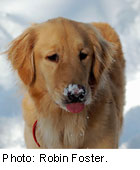
SATURDAY, Dec. 27, 2014 (HealthDay News) — Winter can be tough on dogs and cats, but there are a number of safe and effective ways you can help them get through the cold season, an expert says.
“Sidewalks, driveways and steps are often coated with rock salt or ice-melt products that can prove irritating and drying to animals’ feet,” warns Dr. Greg Nelson, director of surgery and diagnostic imaging at Central Veterinary Associates in Valley Stream, N.Y.
“If they lick their toe pads to remove these substances, the salt or chemicals can also trigger stomach irritation or even more dangerous reactions,” he said in a news release.
He recommended keeping a spray bottle filled with water handy to spray your pet’s feet when they come indoors. Then quickly wipe their paws with a towel to remove any residue.
When the temperature falls below 45 degrees Fahrenheit, you should keep your pets mostly indoors, except to take them out for walks/exercise or to go to the bathroom.
“Outdoor dogs should have an insulated dog house, and be sure outdoor cats aren’t hiding in warm car engines before starting your car. Use plastic bowls for food and water outdoors, not metal,” Nelson said.
Antifreeze is sweet-tasting and deadly to pets. Clean up antifreeze spills immediately and watch for antifreeze leakage on your garage floor or driveway. If you get antifreeze on your shoes, take them off and clean them so that you don’t track the liquid indoors.
“Dry winter weather can leave animals’ nasal passages stuffy, and the same over-the-counter saline drops and sprays we use can safely be given to dogs and cats to ease breathing,” Nelson said.
“Regular Claritin [a quarter of a tablet for cats, up to a full tablet for dogs] also can provide relief for little sniffles. But never use the ‘D’ version of human antihistamines, which indicates the nasal decongestant phenylephirine,” an ingredient unsafe for cats and dogs, Nelson said.
If you can hear your pet breathe through its nose, exposing it to steam heat can also be an easy fix, he said. Rather than use room humidifiers — that steam can scald if pets get too close — bring your dog or cat into a closed bathroom while you run a hot shower, Nelson recommended.
Constipation or bowel irregularity can be a problem for dogs and cats, especially if they get less exercise during the winter. Canned pumpkin (not pumpkin pie mix) is a natural and safe laxative for pets. Use one teaspoon per day in cats and up to two tablespoons per day in large dogs to keep them regular, Nelson said.
People’s use of acetaminophen (Tylenol) increases during cold and flu season, but even small doses of the drug can be deadly to cats. Be sure not to leave acetaminophen tablets lying around. Do not give ibuprofen (Advil) or aspirin to pets unless it is prescribed by your veterinarian.
Be sure to check with your veterinarian before giving your pet any over-the-counter products meant for people, to confirm safety and dose information, Nelson added.
More information
The American Veterinary Medical Association has more about cold weather pet safety.
Copyright © 2026 HealthDay. All rights reserved.

